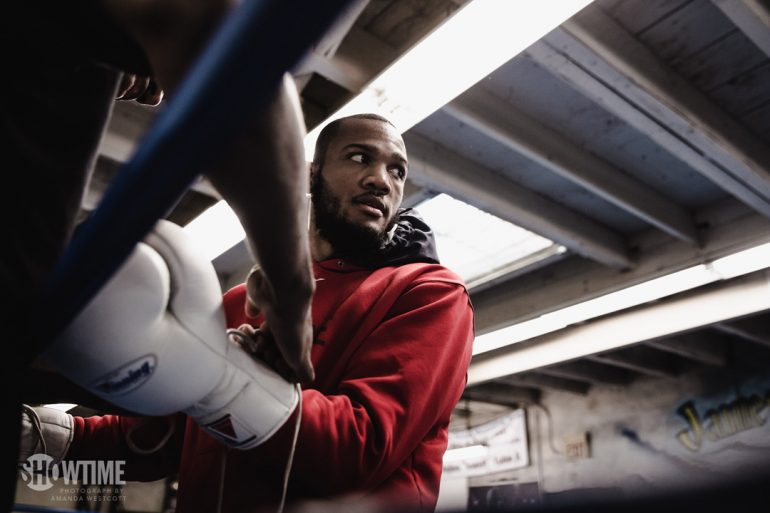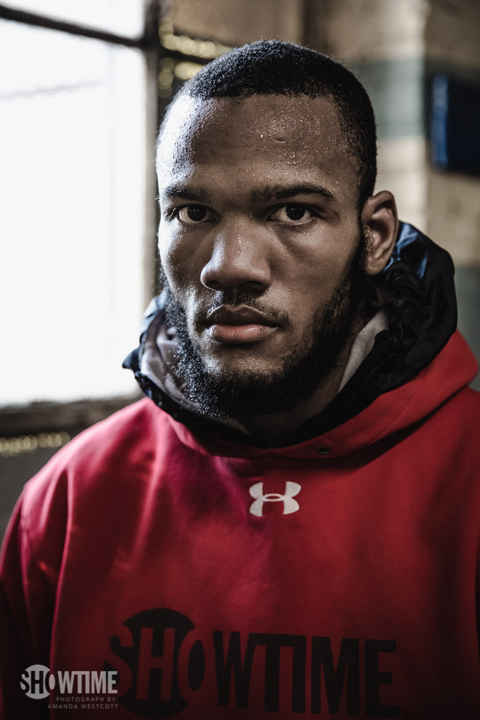Williams carries memory of ‘real hunger’ into Charlo showdown

Julian Williams doesn’t like to talk about his past. He prefers to keep it in a dark, folded away corner of his memory. His usual reaction is to shrug it off and say it’s what “a lot” of kids his age went through. And while most professional fighters have been through many different ordeals, not many were out on their own, living in a homeless shelter as Williams did when he was 13.
His jobs at Boston Market and McDonald’s provided the groceries that he would take back to the shelter. Not many, including friends, teachers and coaches, knew about it at the time. Williams preferred to keep his situation to himself. His mother was battling substance abuse and his father was incarcerated. He wanted no sympathy, and still does not. To Williams, it’s just something he went through. He continues to play it down as nothing special but the experience is clearly part of his tenacious character, which has led the junior middleweight up the rankings and to a world title shot.
IBF 154-pound champion Jermall Charlo (24-0, 18 knockouts) will attempt to defend his belt for the third time on Saturday against Williams (22-0-1, 14 KOs) at the USC Galen Center, in Los Angeles. The Showtime-televised doubleheader also features the Jesus Cuellar-Abner Mares featherweight tilt.
What Charlo will deal with is an challenger so mentally strong that living in the Kirkbride Shelter on Roosevelt Boulevard in North Philly wasn’t a nightmare. Kirkbride is part shelter, part drug rehab, and part holding center for disruptive adolescents.
Williams slept in the homeless portion. He was 13 with a natty blanket draped over one arm, and a pillow tucked under the other, looking down at a thin mattress propped up on thin metal rods. It could be worse, he thought. He could be out clinging to the side of a brick building like many homeless in Philadelphia opt to do on bone-chilling December nights.
“It was rough, don’t get me wrong, but I was very mature at a very young age,” said Williams, now 26. “We had food in the shelter, and I had a place to sleep every night. I always thought I would get out. I always had a positive approach. And, no, I never cried myself to sleep. I’ll admit it was embarrassing. I didn’t want anyone to know. But in time, I let people around me know. I knew I was going to get out and make something out of myself.
 “Boxing was my escape. I don’t know if I can say boxing saved my life, but it helped me a great deal. To me, none of this is something I really like talking about that much, because people, young kids today, go through what I went through all of the time. I suppose the reason I’m talking about it now is if some young kid hears what I went through to make it, maybe this will inspire them to find something in life that they’re good at and work on making it themselves. There is no doubt that I do know what real hunger is. In some ways, I didn’t know where my next meal was coming from.
“Boxing was my escape. I don’t know if I can say boxing saved my life, but it helped me a great deal. To me, none of this is something I really like talking about that much, because people, young kids today, go through what I went through all of the time. I suppose the reason I’m talking about it now is if some young kid hears what I went through to make it, maybe this will inspire them to find something in life that they’re good at and work on making it themselves. There is no doubt that I do know what real hunger is. In some ways, I didn’t know where my next meal was coming from.
“It’s why I’m not ashamed to finally tell my story now. I hope one kid sees this and says, ‘Wow, look where ‘J-Rock’ came from and look what he’s doing now. If he can make it, I can make it, too.’ It doesn’t even have to be a kid, it can be an adult that makes it. I still have things to accomplish. But I’ll always have what happened to me as a kid in a homeless shelter.”
Using it like rocket fuel.
“I don’t look at what I went through as really anything extraordinary,” Williams stressed. “It was a life experience that made me a better person and helped me become the fighter I am today. I’ve had a lot of those life experiences, not one more important than the other. I’m going into that fight Saturday against Charlo knowing what it was really like to be hungry. I don’t know if it’s anything he ever experienced. If someone goes through what I went through, and they have a job and are making a living, they’re a success. They don’t have to be a world-class fighter.”
Williams says he derives much of his inner strength from his mother, who passed away in 2013 from congestive heart failure three weeks prior to his fight with Hugo Centeno Jr.
Stephen Edwards, Williams’ trainer who has known him since 2007 and began training him in 2010, worked at Kirkbride shelter when Williams was living there but didn’t know him at the time. Edwards recalls the death of Williams’ mother, and how Al Haymon, J Rock’s manager, called to ask if he wanted to pull out of the Centeno fight. Williams told Haymon “no.”
Each weekend while training for that fight, Williams would drive down to North Carolina to be with his ailing mother. The day after his mother died, Williams was at the track working out the following morning.
“J Rock deals with things, he just deals with it,” Edwards said. “He’s not the oldest of his siblings, but he is definitely the leader. He’s always been very mature for his age. We never spoke about his mother’s death to the media. We never brought it up. He never wanted any excuses. He just fought. I’ll say something else, and this extremely tough to say, but the reason I say Julian is extremely mentally strong is because he does not like to train.
“If he wasn’t a fighter, Julian wouldn’t be training, and the training we do is brutal. For him to put himself through that, and to not like it, tells you how strong he is mentally. He can mentally push himself through anything. I mean, he’s waking up at 5 a.m. in the morning during a Philly winter and that’s brutal, and I’m not a very nice man in the gym to him. To deal with that, and deal with me, it’s why Julian is amazing. He’s truly amazing.”
Edwards believes J Rock’s performance against Charlo will be impressive. And Edwards also broached an interesting area of growth for Williams over the last few years as to why: J Rock understands the difference between fighting mad and fighting focused. Boxers that fight mad tend to fatigue early, while fighting focused means accurate punches and systematically taking apart opponents.
It’s why the sinewy 5-foot-11 Williams is not wild, why he’s precise and calculating in his attack.
“I call Julian a violent scientist, because he’s cold hearted in the ring,” Edwards said. “There is anger there that he channels and it’s why he fights focused. Julian is a rarity, and unfortunately where I grew up in Philly, I saw families who were torn apart with addiction problems and who had to live in homeless shelters. That adds up through time. When Julian is on and clicking, he’s extremely hard to beat. As a trainer, I can’t become too intoxicated with everything Julian does. He knows he can be better. I know he can be better.
“We don’t want to get too high or too low. He’s better than Jermall Charlo, but if he’s not the Julian Williams that I know, and the best Julian Williams he can be, he can still lose this fight. There’s something I think that bothers Julian more than anything. Coming out of nationals, he had this label that he couldn’t win the big fight. That bothered him as much as the death of his mother. Julian wasn’t eating during that time. He used to take laxatives to lose weight, because he was a kid, he didn’t know any better. He’d win his first-round fight and no strength to continue in the tournament because he was on laxatives.
“Once he got the proper people around him, and began training and cutting weight like he should, you see what he’s capable of today. The best of Julian is yet to come.”















